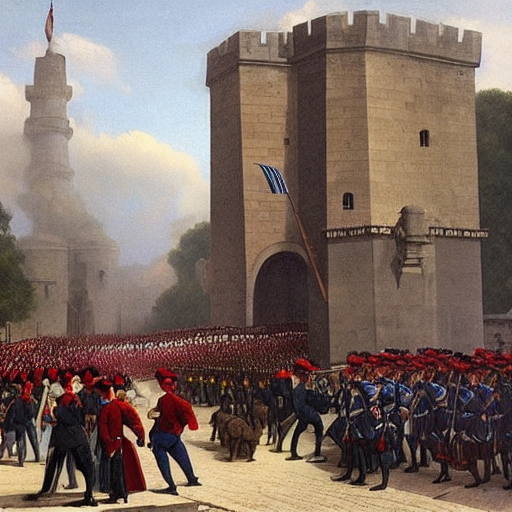「自由」「平等」「博愛」
そんなスローガンで始まったフランス革命。左派の人々にとっては魅力的な歴史上の出来事ですが、よくよく調べれば、その裏にある複雑な構造と、時に悲惨な結果を理解することになるでしょう。
さて、多くの日本人が錯覚をしています。代表的なものをいくつかご紹介します。
まずは「平等」。
生まれた国、地域、家庭など、そもそも人々は出発点が異なります。機会の平等を実現することは、現実的には非常に困難です。
「平等」という理想だけが存在し、その理想を実現するための努力が欠けている場合、「僻み」の感情が芽生え、「ルサンチマン」という怒り、そして「革命」という流れが生まれる可能性があります。重要なのは、「平等」という事実が、単なる「平等への願望」に過ぎないということです。願望が実現すること自体が、錯覚であることに気づく必要があります。
次に「国民主権」。
「主権」とは、単に「支配者」の権力のことではありません。「主」という言葉は、「家主」「地主」のように、権威を象徴する言葉としても使われますが、主権という文脈では「神」を意味することもあります。神の権能は、絶対的な力、無謬性、そして創造性といった意味合いを持ちます。つまり、絶対に間違えないという理想を意味するのです。そんなものが人間にあるわけがありません。
「国民主権」は、結果的に「私が絶対的に正しい」という錯覚を起こす言葉です。この錯覚が酷くなると、「私(たち)が絶対的に正しい」という考えに陥り、異なる考え方や意見を認めず、取り締まったり、抑圧したりする流れが生まれる可能性があります。極左団体が内ゲバを起こしたり、共産主義者が粛清や言論や思想の統制を行うなどの例は、まさにこの錯覚の現れです。
そして「ゴミ分別」。
コンビニのゴミ箱で「紙」と「ビニール・プラスチック」の入口が別れているのは、単なる区別のためではありません。裏では、1枚の袋がゴミを待ち構えています。
「なんで入口が別れてるの?」と疑問を持たれた方も多いのではないでしょうか。一枚の袋に紙とプラスチックのゴミを入れたのは、一緒に燃やすからです。
さらに「リサイクル」。
おもちゃ箱にビー玉が1000個くらい入っている様子を想像してみてください。このおもちゃ箱をひっくり返してビー玉を床にぶちまけたとします。ビー玉を一つ一つ拾って元のおもちゃ箱に仕舞うことを想像してみてください。ビー玉をぶちまける労力と、ビー玉を拾い集めて箱に仕舞う労力は、明らかに異なります。ビー玉をぶちまける行為が、モノの消費です。ビー玉を拾い集めて箱に仕舞う行為が、リサイクルなのです。エネルギーを大量に使うのは、どちらでしょうか?
一旦、この錯覚に陥ってしまうと、本当のことを知ってもなかなか、その錯覚を消すことはできません。本当のことを教えると、怒り出す人さえいます。
大人たちが錯覚していれば、子供に錯覚を植え付けてしまう可能性もあります。これは、非常に恐ろしいことです。
錯覚を取る、あるいは錯覚しないようにする方法をいくつかご紹介します。
- テレビ、新聞、学校で言われたことを、鵜呑みにせず、「本当かな?」と常に考えるクセをつける。テレビや新聞は、人々に錯覚を植え付ける役目を負っています。
- 映像や画像を見て反応するのではなく、文章をよく読んで、深く考える。
- 何事もひと呼吸置き、じっくりと考える時間を持つ。
- 綺麗事を疑う。人を騙す人は、綺麗事を言うものです。
- みんなが言っている、みんながやっている。そう言われたら、疑ってみる。
錯覚を取る努力を、共にしていきましょう。私も、頑張ります。
悲惨な社会を子どもたちに残さないために。
“Liberty,” “Equality,” “Fraternity.”
That was the slogan that launched the French Revolution. For those on the political left, it may seem like an inspiring historical event, but a closer look reveals its complex underpinnings and, at times, its tragic consequences.
Now, many Japanese people are under certain illusions. Let me introduce some representative examples.
First, “Equality.”
People start from different places: the country, region, or family into which they are born. In reality, achieving equal opportunity is extremely difficult.
When the ideal of “equality” exists only as an abstract notion, without the effort to make it real, feelings of “resentment” arise, followed by the anger of “ressentiment,” and possibly a drive toward “revolution.” The important point is that “equality” as a fact is nothing more than a “wish for equality.” We must recognize that believing such a wish can actually come true is an illusion.
Next, “Popular Sovereignty.”
“Sovereignty” is not simply the power of a “ruler.” The word “lord” or “master” is also used to signify authority, as in “landlord” or “head of household.” But in the context of sovereignty, it can also mean “God.” God’s authority implies absolute power, infallibility, and creativity—in other words, the ideal of never being wrong. Obviously, such a thing does not exist among human beings.
“Popular sovereignty” ends up creating the illusion of “I am absolutely right.” When this illusion intensifies, it becomes “We are absolutely right,” leading to intolerance of different perspectives, and even to surveillance, suppression, or persecution. The infighting of far-left groups, or the purges and thought-control by communists, are clear manifestations of this illusion.
And then, “Waste Separation.”
At convenience stores, trash bins are labeled with separate slots for “paper” and “vinyl/plastic.” But this separation at the opening is not for different disposal paths. Behind the lid, a single bag waits to collect all the waste.
Many people have probably wondered, “Why are the slots separate?” It’s because paper and plastic trash ultimately go into the same bag—they are burned together.
Next, “Recycling.”
Imagine a toy box filled with about 1,000 marbles. Now imagine overturning that box and scattering all the marbles across the floor. Then imagine picking up the marbles one by one and putting them back in the box. The effort to scatter them and the effort to gather them again are obviously very different. Scattering marbles represents consumption. Collecting them back into the box represents recycling. Which action consumes more energy?
Once someone falls into these illusions, it is hard to dispel them, even when presented with the truth. Some people even get angry when confronted with reality. And if adults remain deluded, they may pass those illusions on to children. That is truly frightening.
Here are some ways to avoid or remove illusions:
- Do not swallow whole what TV, newspapers, or schools tell you. Always cultivate the habit of asking, “Is that really true?” TV and newspapers, in fact, play the role of planting illusions in people’s minds.
- Don’t just react to images or videos—read carefully and think deeply.
- Always take a breath and give yourself time to think things through.
- Be skeptical of pretty words. Those who deceive often cloak themselves in fine-sounding ideals.
- When you hear, “Everyone says so,” or “Everyone is doing it,” let that be your cue to doubt.
Let us work together to remove illusions. I will do my best too.
So that we do not leave behind a tragic society for our children.

